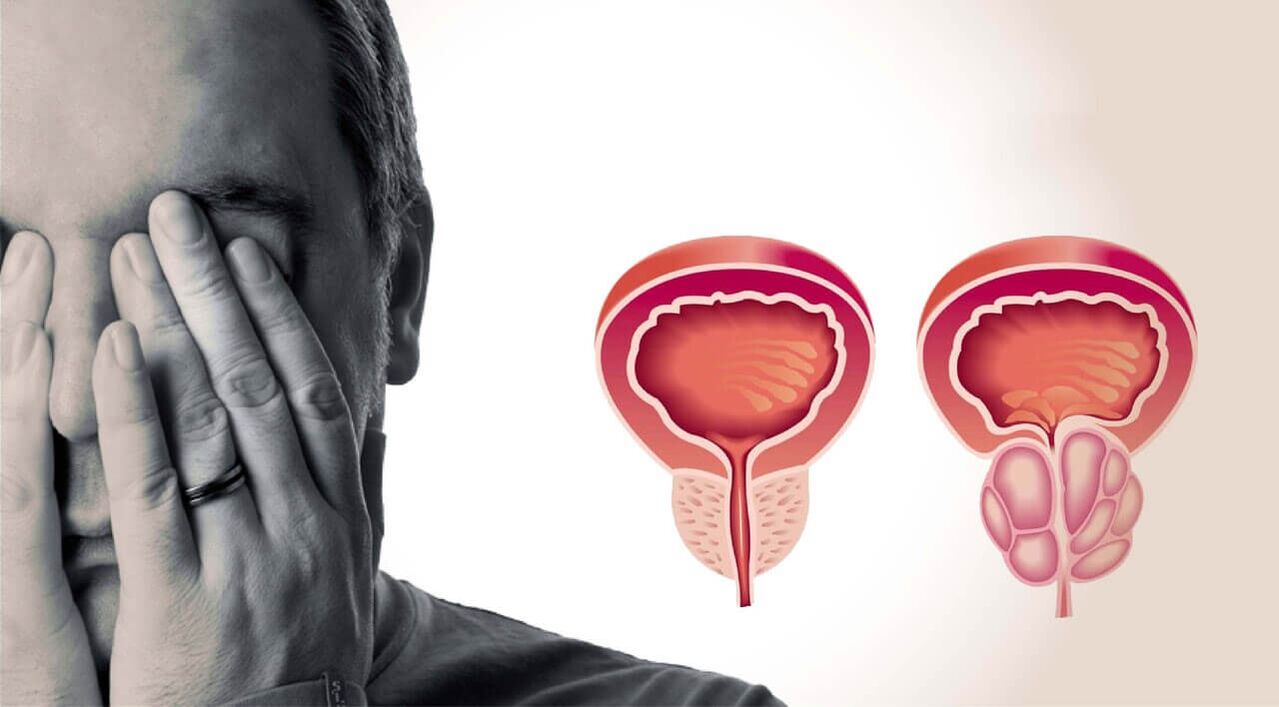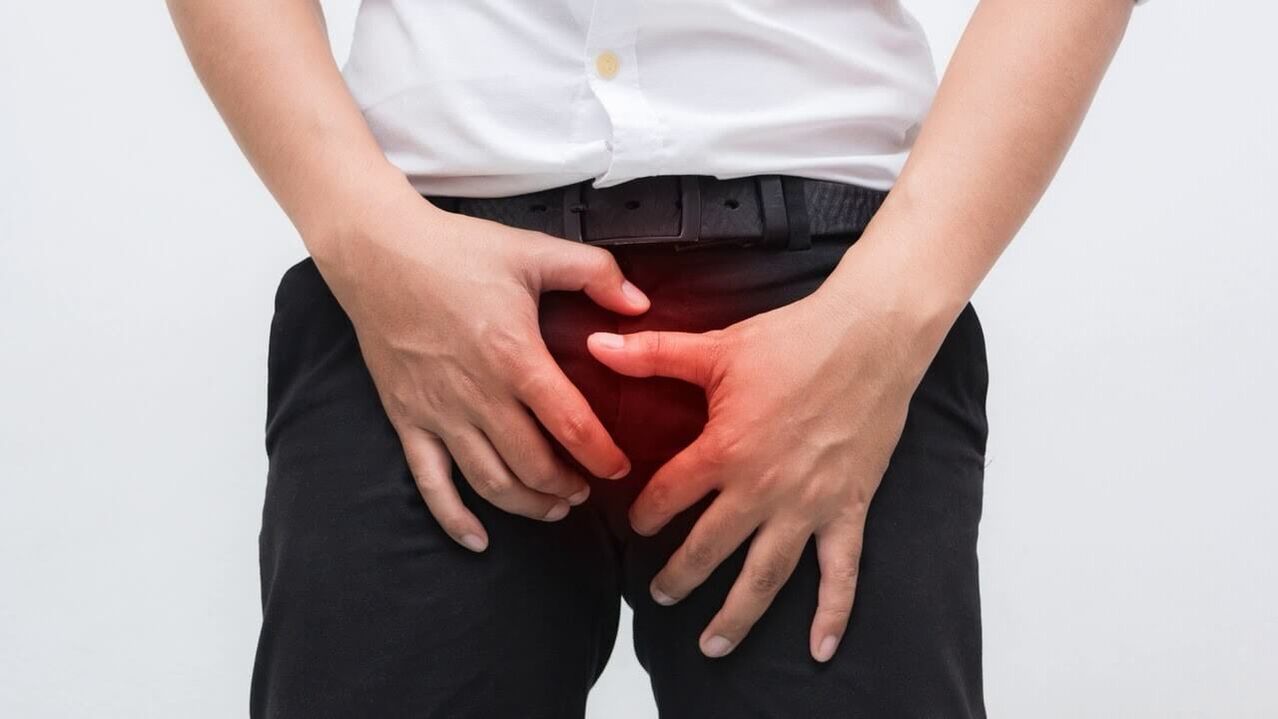Frequent painful urination, perineum discomfort, pyrexia, decreased potency and libido are problems faced by 80% of men aged 45-50 years, but most of them postpone a visit to the doctor until the pain becomes unbearable. Unpleasant symptoms indicate prostate inflammation that requires immediate treatment: prostatitis in men quickly becomes chronic and can lead to infertility, sexual dysfunction, and oncology.
What is prostatitis
The prostate gland is an organ that resembles a chestnut in size and shape, and is located below the bladder. The bottom is bordered by the crotch. The prostate in men performs the following functions: secretory - the production of sex hormones and secretions that determine the quality of sperm, and barrier - the separation of the processes of ejaculation and urination.
The second name of this gland is popularly used to indicate a common disease that affects about half the male population: the older the man, the higher the risk of getting the disease-prostatitis is rarely diagnosed in men aged 20-25 years. The disease is dangerous with serious complications, so it is important to recognize it at an early stage.
The course of therapy takes up to 14 days, for several months the patient must adhere to preventive measures. If the disease successfully takes a chronic form, the risk of recurrence is 50%.
Welding
Treatment of the prostate gland in men is sometimes delayed for years. The disease takes a temporary path without symptoms to remind itself after a few months with a sharp decline in immunity, violation of the intestinal microflora and other stressful conditions for the body. Male prostate disease has several forms:
- Sharp. It is characterized by a bacterial infection of the prostate gland tissue. Special symptoms are severe pain syndrome, a critical increase in temperature. It is necessary to treat the disease in a hospital;
- Chronic bacteria. Periodic decrease in symptoms is often considered a signal of recovery, but this is imaginary - each subsequent exacerbation is more severe than the previous one due to the development of purulent foci, the appearance of neoplasms;
- Asymptomatic. Absence of symptoms with active development of the disease. Such prostates in men are often detected by chance, according to the results of urine analysis;
- Granulomatous. Termination of glandular function due to excessive growth with connective tissue;
- Pelvic Pain Syndrome. The form is difficult to diagnose, accompanied by a persistent sensation of pain in the pelvic area, neurological and psychoemotional disorders.
What does the Prostate Mean in Men? First of all, diagnosis means the need to reconsider lifestyle, be patient and follow the doctor’s recommendations - it may take a long time to be treated.

What causes prostate in men?
The reasons
The exact algorithm for the onset of the inflammatory process in the prostate gland has not been determined, but a pattern has been expressed: the likelihood of pain increases with a decrease in general immunity. Why is this happening? Infectious pathogens, which enter the mucous membranes of healthy people, are in an "inactive" state and do not spread until the body’s protective function is weakened. This is how the male prostate begins to grow.
Factors that increase risk:
- Hypothermia;
- Perineal injuries and bruises;
- STD;
- Inactive lifestyle, inactive work;
- Inadequate sex life;
- Contraceptives with sexual dysfunction (incomplete ejaculation applies);
- Stress, neurosis, depression;
- Bad habits - alcohol abuse, smoking;
- Poisoning with drugs.
Doctors also point to a link between the fashion of tights that squeeze the genitals and increased morbidity. Symptoms of the prostate gland in men who prefer tight jeans are more common than among loose believers.
Chronic etiology
Permanent prostatitis in men is the result of improper treatment (or complete absence) of acute inflammation of the prostate. Causes of exacerbation: venereal diseases, stressful situations at work and family, forced obstruction of the rectum or bladder, wearing tight underwear made of synthetic fabrics.
An additional factor is congestion in the small pelvis due to low mobility. A patient who suffers from prostate itself in men in the acute form must take all measures to prevent recurrence: first of all, walk more on foot to activate blood circulation.
Inflamed prostate gland in men symptoms
Acute prostatitis
There are three types of this disease: catarrhal, follicular, parenchymal (the most dangerous). In the first case, the malaise begins with pain in the genital area and a slight increase in temperature. Soon, a man notices discomfort during urination or intercourse, a feeling of constant fatigue.
This type of follicle is characterized by severe pain in the penis and lower back: it does not allow the intestines and bladder to be completely emptied. If left untreated, a third type of disease develops.
Prostate parenchyma in men what is it? Difficulty defecating turns into complete urinary retention, body temperature reaches 39-40 degrees, discharge of mucus from the rectum appears. His condition is serious and requires immediate hospital treatment.
Chronic prostatitis
The symptomatology of this form is often vague, unexplained, which complicates the diagnosis. The pain syndrome becomes permanent, localized in the lower abdomen and can be easily tolerated. Discomfort increases after intercourse.
Urination is a little difficult - intermittent urine flow. Desire becomes more frequent. After physical exercise, a non -special discharge appears on the head of the penis. Erectile dysfunction is possible. The temperature is maintained around 37 - 37. 3 C.
If symptoms of chronic prostatitis are observed in men, treatment should not be delayed: slow inflammation can lead to infertility.

Diagnostics
A timely visit to a urologist is the best solution for suspected inflammation of the prostate gland. During the appointment, the doctor will ask a few questions about the health condition and look at the patient’s medical records to gather anamnesis. Next, external examination and palpation of the organ through the rectum is performed.
To clarify the diagnosis, a number of studies were commissioned:
- Secret analysis;
- Ultrasound of the prostate;
- Material sampling for PCR;
- MRI of the pelvic organs.
If necessary, the flow rate of urine during urination is measured with a special device, a uroflowmeter. Measurements are performed in the clinic: the patient empties the bladder into a special vessel with a sensor, which, at the end of the process, displays a graphic picture.
Prostate gland in the treatment of men
Before prescribing a course of treatment, it is important to identify all the factors that provoke the inflammatory process. When knowing the true cause of prostatitis in men, treatment is more productive. Urologists develop a comprehensive individual program that includes the following elements:
- Drug therapy. With viral etiology, antiviral drugs are prescribed, and with infectious lesions, antibacterial drugs. In parallel, suppositories and anti-inflammatory creams, immunostimulatory agents, and, if necessary, analgesics were used;
- Physiotherapy. The method is determined based on the description of the disease. It can be electrophoresis, magnetotherapy, laser sessions, UHF;
- Sort. The procedure is performed by a doctor or (after training) by the patient’s partner - emotional comfort and family support are very important for the sick person. Massage increases the outflow of purulent-inflammatory secretions from the ducts of the prostate gland.
The effectiveness of the prescribed therapy is assessed after 10-14 days: if there is a positive trend, the course will be resumed after a short break. If there is no improvement, a decision is made to cancel some medications and procedures, replacing them with other medications.

Prophylaxis
Prostate in men, symptoms and treatment are topics that should be studied in detail by every member of the stronger sex who has reached reproductive age. Awareness of preventative measures will help prevent inflammation.
How to protect yourself from prostatitis? It is recommended to avoid hypothermia and unprotected sex, always tested for STDs. You need to empty the bladder on time, choosing loose pants.






















